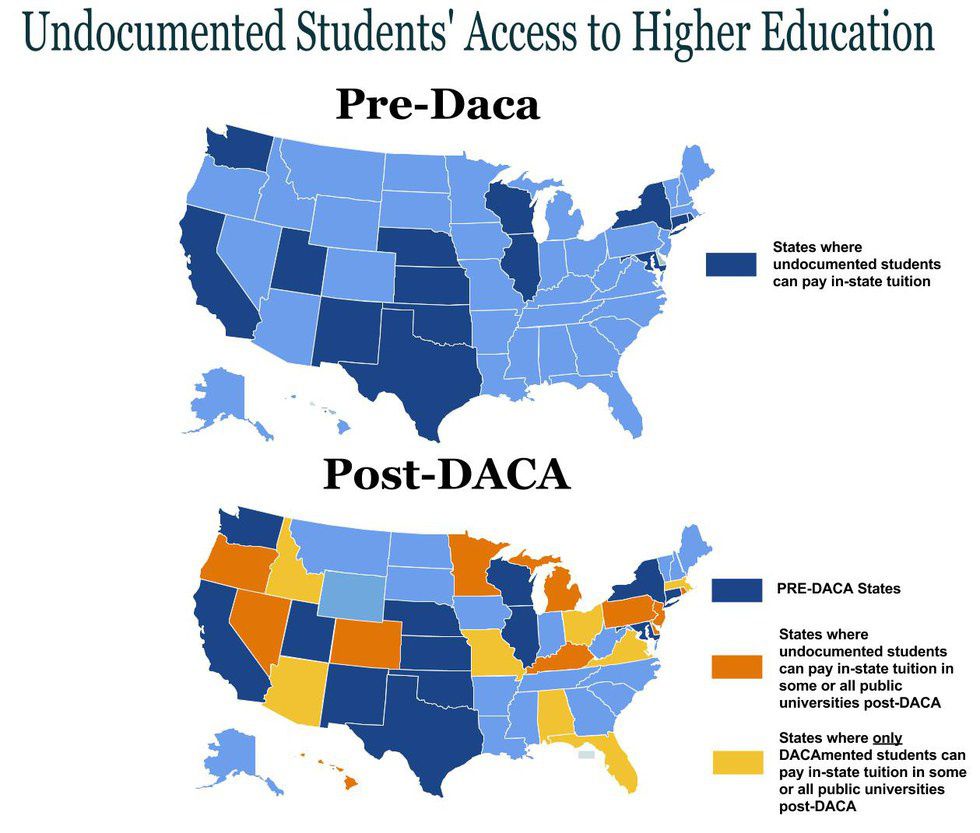The days following the election of Donald J. Trump as the 44th president of the United States, students across the country began to fill uneasy and uncertain of the future in the higher education system. Students and professors assembled to demonstrate that they would not be taunted by the sayings and aspirational actions of the President-elect and made an important statement that stressed the value of each student (whether citizen, Dreamer, or illegal) to the education system of the United States. With the start of a new year approaching and schools requiring the FAFSA application be turned in earlier than expected this year, I have quickly skimmed through the abbreviations, requirements, and gray-area that comes with applying to college.
Some definitions before reading:
FAFSA: The Free Application for Federal Student Aid which was made available on October 1st for the 2017-2018 school year for students and parents who wish to received Federal Aid such as the Pell Grant, Need-Based Grants, Stafford Loans (Subsidized or Unsubsidized), or Parent PLUS Loan.
UNDOCUMENTED/ILLEGAL: A foreigner who enters the U.S. without an entry or immigrant visa, overstays the period allowed as a visitor, tourist, or businessperson, or crosses the border by avoiding inspection
AMNESTY: A pardon extended by the government to a group or class of persons.
DREAMers: In 2010, the DREAM Act (Development, Relief, and Education for Alien Minors) failed to pass the House, but would have eventually given citizenship to illegal aliens who were brought to the U.S. before the age of 16, had clean criminal records, resided in the U.S. for five years continuously, and were between the ages of 12 and 35 when the bill was enacted. The act failed however the name stuck and the term applies to a generation of illegal aliens under the 35 who seek amnesty, federal tuition assistance, and full/partial legalization.
DACA: In 2012, President Obama implemented a program called Deferred Action for Childhood Arrivals (DACA) which allows undocumented immigrants who entered the country as minors to receive a renewable two-year period of deferred action from deportation and are eligible for work permit.
Eligible Non-U.S. Citizens that qualify for federal aid:
-U.S. permanent resident with a permanent resident card or “green card”
-Granted refugee, asylum, Cuban-Haitian entrant, conditional entrant (before 04/01/1981), or parolee status by the U.S. Citizenship and Immigration Services with Arrival-Departure Record (I-94) as proof
-Hold a T-visa (for victims of human trafficking) or your parent holds a T-visa
-Battered immigrant-qualified alien who is a victim of abuse by a citizen or permanent resident spouse or are a child of a person designated as such by the Violence Against Women Act (VAWA)
-Citizen of the Federated States of Micronesia, the Republic of Palau, the Republic of the Mashall Islands
-Certain Native American students born in Canada with a status under the Jay Treaty of 1789
Around 50,000 to 70,000 undocumented students graduate high school each year, but many do not apply to colleges or universities because of economic accessibility. Today over a dozen state funded institutions that accept undocumented students and DACA students charged these students out of state tuition as if they are international students even if they have resided in the state for most of their life. Unlike international students, some universities will revoke institutional scholarships awarded to DACA/undocumented students once they have been awarded if they are aware that the student is not a citizen.
Student’s parents hesitant or afraid to fill out a FAFSA should not worry about their financial information being used against them. Parents’ citizenship or immigration status does not interfere with a student’s aid. The FAFSA does not ask about the parent’s status, if a parent does not have a Social Security Number (SSN) they can enter all zeros for the figure instead.
States like California, New Mexico, Oklahoma, Texas and Washington have state programs in place that will grant financial aid to students who are classified as illegal/undocumented. However, most students residing in the other 45 states are not eligible for federal aid like loans and grants through the FAFSA and must resort to paying out of state tuition with alternative loans in which the bank or lender set the interest rates, terms, loan limits and condition leaving less room for flexibility. The FAFSA, however, can benefit students who wish to apply for non-federal grants and scholarship with their Student Aid Report (SAR). The SAR calculates a student’s financial need based from their family’s information and is important for organizations or institutions offering scholarships for DACA or undocumented students.
The FAFSA is a FREE application and student do not have to pay to complete it, many college and universities have financial aid offices located in their administrative buildings on campus that can help students and parents complete the application. The FAFSA estimates a student’s Estimated Family Contribution which determines how much money a student’s family should contributed to a student’s education. Each university will determine a different EFC for most students because figures are based off of the cost of attendance of each institutions.
For more questions, these websites will better explain federal aid for DACA or undocumented students.
United We Dream
This article was published based on research an experience as a financial aid peer counselor at my university for three years, if you have specific questions that you believe I can help with feel free to contact me:michelle1394@msn.com




















